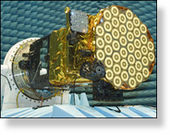
© BBC NewsThe Giove-B demonstrator was launched earlier this year
A test spacecraft for Europe's future satellite-navigation system has been rocked by a surge of space radiation.
The incident forced the Giove-B satellite to adopt a "safe mode" for two weeks in which only essential power systems were kept running.
European Space Agency (Esa) engineers have brought the satellite back up and are now studying what happened.
Giove-B carries the technologies that will be incorporated into the Galileo network when it becomes operational.
These include the atomic clocks which provide the precise timing that underpins all sat-nav applications.
Giove-B, and its sister demonstrator Giove-A, are the first European missions to fly in the high-radiation environment of a medium-Earth orbit (MEO), at an altitude of 24,000km.
This region of space is known to have a high intensity of fast moving particles that can disrupt spacecraft electronics. One of the objectives of the test satellites is to get a better understanding of the space environment in MEO, and they were launched with radiation monitoring equipment.
But engineers would not have expected Giove-B to suffer such a glitch, and they will be very keen to get on top of the issue and identify precisely which components in the satellite had a problem. Giove-A was unaffected by the event.
Giove-B went into safe mode on 9 September. This is standard procedure for a spacecraft when a significant anomaly arises. The satellite halts its mission activities and concentrates on keeping its batteries topped up by ensuring its solar panels are properly aligned with the Sun.
Engineers put the spacecraft back in a stable, active mode on 24 September.
The demonstrators will be followed by 30 operational satellites and they will all need to be protected against similar incidents.
Galileo is envisaged as a rival to - but technologically complementary with - the American GPS (Global Positioning System).
It is touted as a key high-technology venture for the EU.
Galileo is designed to improve substantially the availability and accuracy of sat-nav signals.
These signals already play a fundamental role - not just in navigation, but also in electricity distribution, the functioning of e-mail and the internet, and in the security of financial transactions and many other economic activities.
Galileo's improved clocks are expected to deepen and extend this role.
The better penetration and guarantees of service promised by Galileo should also give many more entrepreneurs the confidence to build business plans around sat-nav, say supporters.
It is supposed to become fully operational by 2013.
Europe has already spent more than 1.5bn euros on the project. At the end of last year, ministers approved a further 3.4bn euros for the period 2007-2013 - although these funds cover not only Galileo but also an associated programme known as Egnos, which is an "overlay" system of control and correction that improves the current GPS service received in Europe.

Reader Comments
to our Newsletter